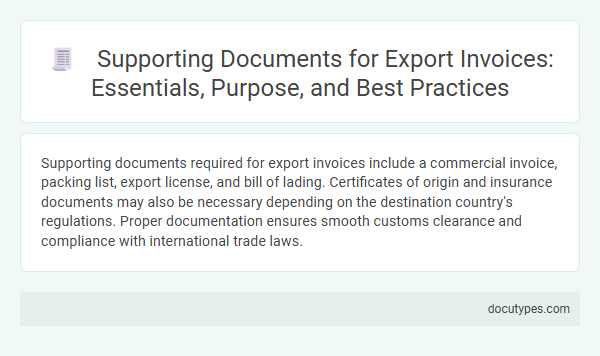Supporting documents required for export invoices include a commercial invoice, packing list, export license, and bill of lading. Certificates of origin and insurance documents may also be necessary depending on the destination country's regulations. Proper documentation ensures smooth customs clearance and compliance with international trade laws.
Introduction to Supporting Documents for Export Invoices
Supporting documents are essential components of export invoices, ensuring compliance with international trade regulations and facilitating smooth customs clearance. These documents verify the accuracy of the transaction and provide necessary details for importers, exporters, and customs authorities.
Common supporting documents include the bill of lading, packing list, certificate of origin, and insurance certificate. Each document serves a specific purpose, such as proving shipment ownership, itemizing goods, confirming product origin, or validating coverage against loss or damage.
Importance of Supporting Documents in International Trade
| Supporting Documents for Export Invoices | Importance in International Trade |
|---|---|
| Packing List | Details shipment contents, facilitating customs clearance and reducing delays at port of entry. |
| Bill of Lading | Acts as proof of shipment and contract of carriage; essential for ownership transfer and cargo tracking. |
| Commercial Invoice | Specifies product value, description, and terms; foundational for customs duties and tax assessments. |
| Certificate of Origin | Verifies product origin; crucial for tariff determination and compliance with trade agreements. |
| Export License | Grants legal permission for certain controlled goods; ensures compliance with export regulations. |
| Insurance Certificate | Confirms insurance coverage on goods during transit; protects against financial losses from damage or theft. |
| Inspection Certificate | Validates quality and quantity of goods; enhances buyer confidence and meets import country standards. |
| Importance Summary | Supporting documents are critical for verifying transaction authenticity, ensuring regulatory compliance, expediting customs processing, and minimizing risks in international trade transactions. |
Essential Supporting Documents Required for Export Invoices
Essential supporting documents are crucial for export invoices to ensure smooth customs clearance and compliance with international trade regulations. These documents validate the transaction details and facilitate timely payment and shipment processing.
You must include the commercial invoice, packing list, and bill of lading as primary supporting documents for export invoices. The commercial invoice provides product description, quantity, and price, while the packing list details the contents and packaging specifications. The bill of lading serves as proof of shipment and contract between the exporter and carrier.
Commercial Invoice: Key Components and Role
The commercial invoice is a critical document that serves as a detailed record of the transaction between the exporter and importer. Key components include the seller and buyer's contact information, a detailed description of goods, quantities, unit prices, total value, and payment terms. Your export invoice must include this document to facilitate customs clearance and ensure accurate shipment processing.
Packing List: Details and Relevance in Export Documentation
Export invoices demand precise supporting documents to ensure smooth customs clearance and shipment verification. The packing list plays a crucial role in detailing the contents and arrangement of goods in your export documentation.
- Packing list details item quantities - It specifies the exact number of units per package for accurate inventory checks.
- Packaging type and dimensions are outlined - This information aids in assessing storage requirements and transportation handling.
- Packing list complements the commercial invoice - It provides additional clarity required by customs authorities to verify shipment contents.
A well-prepared packing list enhances transparency and reduces delays in the export process.
Bill of Lading: Significance and Requirements
The Bill of Lading is a crucial supporting document for export invoices, serving as proof of shipment and ownership transfer. It ensures smooth customs clearance and shipment tracking, making it essential for international trade.
- Proof of Shipment - The Bill of Lading confirms that your goods have been loaded onto the vessel for export.
- Ownership Evidence - This document acts as a title, indicating who holds ownership of the cargo during transit.
- Customs Requirement - Customs authorities require a valid Bill of Lading to process and clear export shipments efficiently.
Certificate of Origin: Purpose and Verification
The Certificate of Origin is a crucial supporting document for export invoices, certifying the country where the goods were manufactured. This certificate helps customs authorities determine the applicable tariffs and compliance with trade agreements.
You must ensure the Certificate of Origin is accurate and properly verified by authorized entities before submission. Verification safeguards against delays or disputes during the export clearance process, ensuring smooth transaction flow.
Regulatory Compliance: Ensuring Accurate Supporting Documentation
Export invoices must include precise supporting documents to comply with international trade regulations and avoid customs delays. Essential documents typically involve the commercial invoice, packing list, bill of lading, and certificates of origin. Accurate and complete paperwork ensures smooth clearance, legal compliance, and reliable transaction records for all parties involved.
Best Practices for Organizing and Submitting Export Documents
What supporting documents are required for export invoices? Export invoices must include a commercial invoice, packing list, and bill of lading. Customs declaration forms and certificates of origin are also essential for international shipments.
How can you best organize and submit export documents? Arrange documents systematically, matching each invoice line item with its corresponding paperwork. Submit all files electronically or physically according to the recipient country's regulations to ensure smooth customs clearance.
What Supporting Documents Are Required for Export Invoices? Infographic

